- Home
- Andersen Prunty
The Driver's Guide to Hitting Pedestrians Page 2
The Driver's Guide to Hitting Pedestrians Read online
Page 2
Unless he knows something I don’t.
18.
Unicorn continues to drive along Route 4, down past Germantown. The steam continues to billow. He’s losing speed. He pulls into a gravel pit. His truck idles in front of the unnaturally blue quarry lake, the airbrushed unicorn with Peggy’s face on the ass trembling with the dying rhythm.
I again turn my radio off.
Unicorn and Hidalgo are just sitting in the cab of the van, staring at me. Maybe daring me. But to do what I don’t know. We are now in a fairly rural area. For some reason, there is no one working at the quarry and everything is silent except for the occasional car up on the state route.
I check my phone.
Coffee still hasn’t hit anyone else.
I’m so close to Hidalgo.
All he has to do is step out of the van.
I’m prepared to wait until midnight.
19.
The moonshine has made me kind of tired so I keep chomping coffee beans. I want to get out of the van so I can brew some fresh coffee over the heat of the engine but I know Hidalgo will take that chance to run. If he even plans on it. Occasionally, I open my door and feign stepping out, hoping this will coax Hidalgo out. At one point I unleash a vicious rant in their direction. They do not pay it any mind.
Around sunset, Unicorn steps out of his van and says to me, “This is your time to shine, isn’t it, Sunset?”
I would drive into him but then I would have to waste time taking him to the hospital, going in the opposite direction of Hidalgo.
Unicorn has a can of spraypaint in his hand and he crosses to the side of my van. He begins spraypainting something on the side of it. I try to see what it is from the side mirror but I can only make out the first letter. It’s an “L”.
While the mystery of what he’s spraypainting and the desire to beat him to a pulp are overwhelming, I remind myself that I need to keep my eye on the prize.
Hidalgo.
A life of fortune.
A lonely life of fortune.
But with money, people would gravitate toward me. I could keep them entertained while entertaining myself. I could buy a huge house and have parties every night and ...
I realize I don’t like any of that stuff.
I don’t like parties.
I don’t like people.
I don’t like party people.
I liked being a mechanic. I liked coming home to Peggy and reading about races in other countries. I liked to dream of going there. I liked the dream. I didn’t know if I would like going there or not. Definitely not alone.
Coffee still hasn’t hit a single pedestrian all day.
There hasn’t been a single update since Unicorn’s disqualification.
I think about bribing Hidalgo to come out and let me hit him. Just a tap. But that’s against the rules and with Unicorn right there, I’d never get away with it.
It gets dark. The summer night air is alive with the smell of honeysuckle and the burning rubber and exhaust from the state route. In the distance, in the dark and silent woods, someone has started a fire. Insects hum and rattle their drawn out rhythm.
This is how they’re going to beat me.
If Hidalgo survives, he gets a fairly large sum of money too. It’s possible he’s worked out something with Unicorn. It’s possible that’s what they’ve been talking about in the cab all this time. In low tones so I can’t hear. It’s possible even that they’ve both worked out something with Coffee. Two winners split three ways is still a pretty good bank.
And like that, all hope leaves me. This van was customized on hope and now it’s empty.
I’ve been empty for a long time. Maybe I just confused hope with self-delusion.
I look into Unicorn’s van and see his and Hidalgo’s faces lit by the orange light of the dash.
I turn the radio up, the sound roaring out into the night.
I reverse until I’m a fairly good distance away. Then I slam the van into drive and shoot forward.
There isn’t an explosion or anything. Just the satisfying impact and crumple of metal on metal. The concussive shattering of glass. The cold slurp of the water in the gravel pit.
And we’re all wrapped in metal and broken glass and water.
And we’re all going down into the cold depth of the gravel pit.
All going down.
All together.
The Laughing Crusade
After finishing my treatise on the New Anarchist Revolution I decide to head out to the back porch for a beer and a cigarette. The television lies on the floor in a broken, smoldering heap. I pull a beer out of the refrigerator, cross the kitchen and go outside. It’s hot and humid. Quiet, but the neighborhood kind of quiet, which isn’t really quiet at all. Wind in the trees. The humming of a neighbor’s air conditioner. Buzzing streetlamps. Televisions murmuring through open windows. A telephone ringing. Distant traffic. Distant trains. Distant sirens. All the real noise is distant.
I light a cigarette and take the first deep drag and all the quiet unquiet is shattered. Someone laughs. It’s loud and continuous, emitted from somewhere high up in the nasal passages. Female. It’s like she has some sort of loudspeaker between her eyes. I don’t hear anyone else. Just this one woman, laughing and laughing. I sit down in a chair, rest my beer bottle on the small patio table, and try to block out that heinous laughter and focus on my next treatise. I can’t. Jesus. She sounds like a braying donkey. I finish the rest of my beer in a single gulp, take the last drag from my cigarette and toss both of them out into the yard.
Inside, I can still hear the laughter. I picture her standing there on her porch, leaning out over the steps, laughing and laughing and laughing.
I urinate on the busted television and head upstairs. I lie down next to the woman who has been lying comatose in this bed since I moved in nearly two years ago. She breathes slowly and steadily. Normally, her breathing is soporific but tonight it is drowned out by the braying donkey. She must live in the house across the street and just to the north.
Hours later, pillows piled around my head, I finally fall asleep.
And wake up to laughter. Loud. Raucous. Bursting forth in unrelenting waves.
What can possibly be so funny? This woman has laughed more in one night than I have my entire life. In fact, I have only laughed three times I can remember. Each time, something dreadful happened in the following days and I don’t know if I remember the laughter because of the funny things that happened or because of the subsequent tragedies.
I curl my hands into tightly balled fists and hop out of bed. I will wait until nightfall, I decide. And then I will have to find out what donkey girl is laughing at, if anything.
The laughter continues unabated throughout the day. At dusk, I delve into the closet and suit up—a black jumpsuit, black leather gloves, and a black ski mask—items I keep around for just such occasions.
The laughter has tapered only slightly. It seems she must have gone inside. No bother. I still had to find out what all the laughing was about. I go outside.
Unseen, I slowly approach the house until I am at eye level with what must be her living room. She doesn’t use any curtains or blinds. There’s practically no one in the neighborhood anyway and, even if there were, surely someone who laughs with such reckless abandon is not the least bit interested in privacy.
A burly female with short, spiky hair and skin like a potato’s sits on the couch, staring at her television and laughing uproariously. A large caramel-colored dog stands on the couch next to her, licking the side of her head. Where the dog has licked, the hair is wet, matted down to that gross skin. I notice what’s happening on her television and her laughter shocks me even further. Mushroom clouds, atrocity slaughter footage, torture, buildings crumbling, farms burning, people screaming before being consumed by conflagrations.
Not funny stuff.
Amidst the laughter I hear footsteps. I duck behind a row of shrubs and watch three people in gas m
asks approach the house. Not bothering to knock on the door, they just walk right in.
Now I’m totally enthralled. Perhaps they’ve come to take her away. That kind of thing happens all the time.
Simultaneously, they pull off their gas masks. Even more laughter rips through the night. So they weren’t gas masks at all. They were anti-laugh masks. How full of joy or insanity must one be before needing an anti-laugh mask?
Now the burly laugher rises and they all head toward the front door, led by the dog, the atrocity footage still playing on the television. That kind of thing was exactly the reason I had to deactivate my television. The world had become a brutal place and I didn’t want it in my home.
The dog sniffed a trail to the neighboring house. No one lives there, I thought. The dog sniffs the door, raises its paw and scratches. Maybe someone does live there. A squatter, perhaps. Someone hiding out. The laughers enter the house and come back out with a withered, sad-looking old man. They circle around him, laughing and laughing. They tap him on the shoulder, indicating for him to share a laugh. He tries. He bleats out a laugh, raising his arms in the air. Forced. Unnatural. Even I can tell and I’m not even very close. They shackle him, drag him down onto the ground, and strip off all his clothes—choking him, beating him until he is dead.
What’s the point of this?
Are these people with the government? Are they law enforcement? Is it now a requirement to be a laughing hyena?
Apparently it is.
I retreat to my rooftop and, through powerful night vision binoculars, watch the laughers continue their cruel crusade. Or is it a hilarious crusade? They drag the quiet and the sober from their homes, beat them to unconsciousness, and toss them out into the road where a large truck equipped with a giant clown head comes along and scoops them up with a creepily fleshy, oversized hand. Meanwhile, people like Jimmy, the neighborhood drunk, the one who pisses in his lawn all the time, are able to join their ranks, increasing their overall volume of laughter.
I don’t know what to do. What will become of me if they rush into the house and find the television all broken or, worse, what if they find my treatise? I flush it down the toilet. I try to be quick about it but I have to go nearly page by page to avoid clogs. Now they are knocking on the door. Has it always been like this? I can’t remember. I can’t remember much of anything. Still, they knock on the door. My memories are not important. Was I ever one of them? Did I ever laugh like that? I can’t imagine it.
The dog scratches.
The laughers laugh and knock and laugh.
I look at the comatose woman.
What if I was in a coma?
Where did that truck take all of the non-laughers?
The front door opens downstairs. I throw myself in bed next to the comatose woman. She smiles, opens her eyes and says, “It works. I’ve been faking all this time,” before snapping them shut and resuming her breathing. I close my eyes as the laughers enter the room and wonder what the comatose life will be like.
Architecture
The architect climbs to the roof of his tallest building and looks out over the city. He’s built all the buildings here. Some of them are small—two or three floors. Others are towering skyscrapers. Like this one. He has to build just one more. It’ll be his greatest construction and then he’ll retire and allow some other architect to move in and build structures that shame his. But he wants to do something different with this one. All the other ones, while his design, were built by construction companies. He will build the next one himself.
Not knowing where else to begin, he goes to the brick store and buys every brick they have. He has them brought to a vacant lot next to the sea. He places the first brick on his back. And then another one. It quickly becomes painful—his arms do not want to move in that direction—but, after a while, it gets easier. The brick store continues to bring him more bricks as they get them in. He continues stacking them on his back. Yes, this is what he wants to build. The tallest building in the city with himself as the foundation. He wants it to be a movable structure but, already, his legs are starting to buckle with the weight and he doesn’t know if this will be a possibility.
Eventually, the building becomes taller than his arms will reach. Each day he stretches a little farther. And his arms stretch with him. The bricks sink into his back and become part of him. This goes on for years. He becomes bent and twisted, his arms a hundred stories long. He doesn’t know what to do with them when he isn’t using them so he keeps them in the lobby. Contrary to his previous belief, he is still able to move around. While his torso has nearly disappeared under the crush of the bricks, his legs have thickened with rippling muscles as hard as brick themselves. Not bad for an old man, he thinks. With his current construction on his back, he wanders over to his previous skyscraper to see how he’s measuring up. It’s close. Only a few more floors, maybe.
Once finished, he is so thoroughly enmeshed with the skyscraper he can’t distinguish himself from his building. His arms remain absurdly long. He raises them into the air and uses them for antennas. His legs are only about a fourth their original length and, while they can support the structure, it becomes dangerous to move, lest everything topple over.
As with the ending of all his previous constructions, he is eager to climb to the top of it. Since he no longer has any body to climb with, he puts his head in the elevator and shoots it up to the roof. There he watches the evening and the fog roll in, the distant ships out at sea and, in the other direction, the twinkling lights of his previous constructions. He feels the cool damp breeze and hears the distant drone of airplanes transporting their sleeping cargo away to another city, careful to avoid the steady blinking of the architect’s fingertips.
Chainsaw Mouth
A man goes to the dentist and has a chainsaw installed in his mouth. The chainsaw is not something he specifically asked for, it just works out that way. Leaving the dentist’s office, he tries to say “Thank you” to the receptionist but the only sound that comes out is the deafening rev of the chainsaw.
He gets home early and decides he can probably get some work done. The man is a salesman. Grabbing his bag of merchandise he heads out to the neighborhood, going door-to-door. Whenever he has something new, some kitchen gadget everyone needs, he always starts in his own neighborhood, figuring neighbors with a lot of appliances are happy neighbors indeed.
He knocks on Mrs. Frick’s door. She lives at the end of the street. He waits impatiently for her to come to the door, shifting anxiously from foot to foot. An inordinate period of time passes and Mrs. Frick throws open the door. Half of her face is covered in make-up. The other half looks old and wrinkled.
The man goes into his spiel but the only thing coming from his mouth is the grating sound of the chainsaw. Mrs. Frick gasps in horror and backs away from the doorway. The man holds an arm of comfort out to her, begging her to stay and listen to him. She slams the door in his face and he reaches into his bag and pulls out some merchandise, leaving it on her doorstep. To his dismay, the merchandise is not some new household appliance. It is a bondage magazine and a snuff film. He wants to reclaim the merchandise but he’s so appalled and frightened that he can’t. He scampers off to the next house and repeats the same process, telling himself it can’t be that bad. This time he finds himself throwing child pornography and a crack rock into the home of the retreating Miss Gallop.
The day does not get any better. His neighbors become more abrupt and violent—some of them openly hostile. His chainsaw voice becomes louder, more antagonistic. His merchandise becomes even darker and more illegal—Nazi propaganda, body parts. He retreats back to his house, throwing the door shut and locking it. He hides in the closet and crouches down, weeping with his new gasoline-powered voice.
Napper
A man comes home from work and surveys the living room. “Hmmm,” he muses. “Think I’ll take a nap.” He lies down on the couch, pulls a blanket up around his chin, and immediately falls asleep.
His wife throws the closet door open and enters the room. She looks at her husband, napping, snug in his covers, a trickle of drool running from the corner of his mouth, and a look of worry crosses her face. She pulls a chair beside the couch and stares at her sleeping husband. He naps for hours. She wrings her hands in her lap and mutters, “I can’t live like this.” Her worried look turns into one of fear. She stands up and kicks the chair over. She grabs her husband and shakes him violently. “I can’t live like this!” she screams. The man continues napping, dead to the world. She uprights the chair, placing it beside the couch. Again she sits down and stares at her husband. “One day,” she says. “One day you’ll get yours.”
She decides to turn the television on but every channel features a close up of a man sleeping. She stares at the remote control held tightly in her hand and then at the television, her face wrinkled with terror. She hasn’t slept for years. It makes her think of death. She wanders around the house and turns all the lights on. She retrieves her cell phone, held hostage by an angry houseplant, and systematically calls the rest of her family, all of them suffering the same affliction as her. They meditate on their sleeping spouses and devise complicated plans to eradicate sleep from society. She hangs up with the final family member and just when her thoughts turn to the lonely night ahead, her husband wakes up and says, “Ah, that was a damn fine nap.” She asks him if he wants to go out and fuck shit up. “Of course,” he says. “Of course.” He knows that’s the only way he’ll ever get to sleep tonight. With baseball bats, blowtorches, and high powered flashlights, the couple head out into the cold night.
Princess Electricity
Immediately following a heated argument, the man with the lice-ridden beard and gnawed peg leg throws me from the pink dirigible. I barely have time to think about the genesis of this argument as I fall through the air, the trees, the soil, and the bedrock, crashing down on a quiet suburban street somewhere in the middle of the earth. An object, apparently hurled out after my ejection, hits me in the head. It hurts quite a bit and I run my hand along the top of my skull to make sure it isn’t bleeding before checking to see what the object is. Looking down, I see that it is an old, rusted skeleton key. I pick it up and put it in my pocket. Something like that ... you can’t just leave it there.

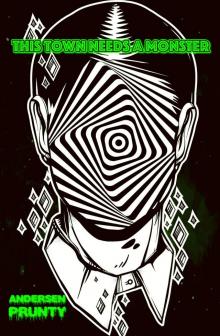 This Town Needs a Monster
This Town Needs a Monster Irrationalia
Irrationalia Sunruined: Horror Stories
Sunruined: Horror Stories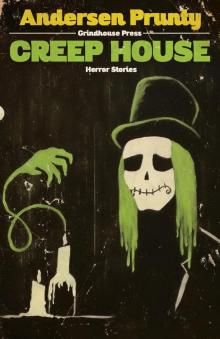 Creep House: Horror Stories
Creep House: Horror Stories Sociopaths In Love
Sociopaths In Love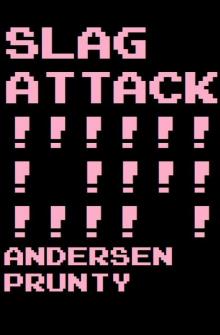 Slag Attack
Slag Attack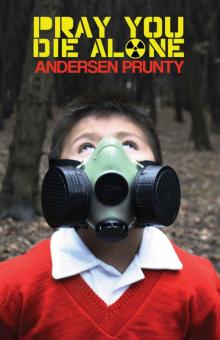 Pray You Die Alone: Horror Stories
Pray You Die Alone: Horror Stories Satanic Summer
Satanic Summer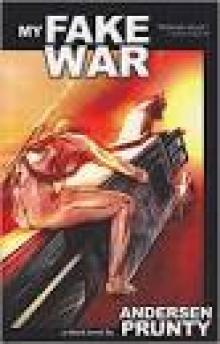 My Fake War
My Fake War Jack and Mr. Grin
Jack and Mr. Grin The Warm Glow of Happy Homes
The Warm Glow of Happy Homes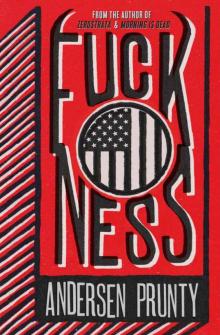 Fuckness
Fuckness Bury the Children in the Yard: Horror Stories
Bury the Children in the Yard: Horror Stories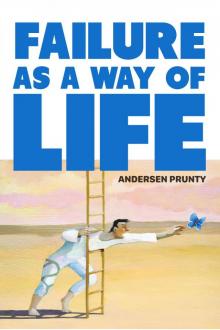 Failure As a Way of Life
Failure As a Way of Life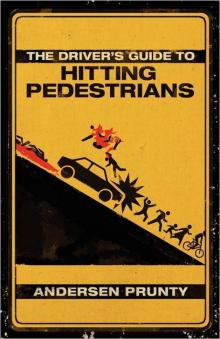 The Driver's Guide to Hitting Pedestrians
The Driver's Guide to Hitting Pedestrians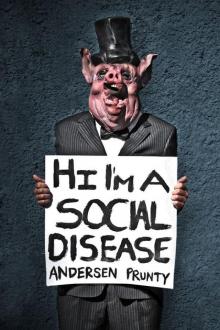 Hi I'm a Social Disease: Horror Stories
Hi I'm a Social Disease: Horror Stories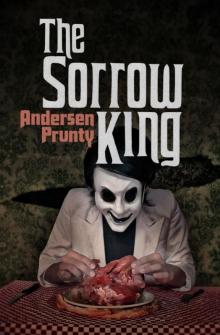 The Sorrow King
The Sorrow King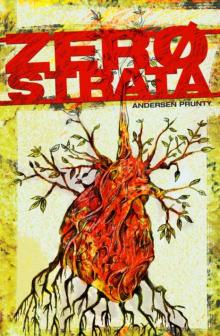 Zerostrata
Zerostrata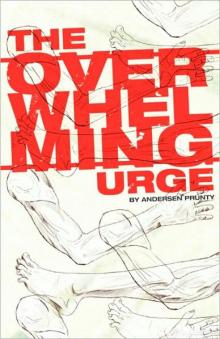 The Overwhelming Urge
The Overwhelming Urge